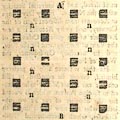





A Letter from G. SMITH, Esq. concerning the Altar, &c. (See Vol.XI. p.650. and our last p.30.)
SIR,
I Have nothing to add, in relation to this Altar, being agreeably prevented by so judicious an Antiquary as Mr. Ward; what I have to say, shall be confin'd to the local Observation made a third Time at Cast-steeds, in order to satisfy his Enquiry.
The Dimensions of the Hypocaustum are 5 yards by 9 within the Walls; the ground floor was of Clay in which the Stone Pedestals were fix'd, about 4 or 5 Inches deep more or less, so as to bring them to a perfect Level at Top, their Height including the Depth in the Clay is generally about 2 Foot; supported by these pedestals was a second Floor of white Stone about 1 Inch thick and curiously cemented for the Bath. The paralellopipedons of burnt Clay were plac'd quincunx form, betwixt every other Row of these pedestals, and were 5 or 6 Inches short of their Height, in order to give Passage for the Smoak to warm the Bath; a perspective Draught of what remain'd being sent you before, I shall here give you an ichnographical Plan of a few of them, in order to the better understanding the whole.


Here the Squares represent the Ichnography of the Pedestals, and the n's that of the Clay Parallelopipedons which were omitted in every other Row, as A B. There were above 100 Pedestals in all, 2 Pedestals and the Vacuity took up above 28 Inches as near as can be judg'd from the present State of their Situation on the Floor.
Mrs Appleby, who deserves to be gratefully remember'd by all Lovers of Antiquity, took great Pains to preserve what she cou'd of those valuable Remains of the Antients, she found there the Ruins of the Bottom and Sides of an Iron Grate, which that Lady still has at Cast-steeds, and some Pieces of Charcoal were lying up and down on the Floor.
Adjoining to the South Wall where the Grate stood, were two curious Rooms, supported in the same manner with Pedestals, and Conduits betwixt them, still running fresh when that Lady found them, but on admission of the Air, all have gone to ruin. The Floors of these Rooms that rested on the Pedestals, were pav'd in the same manner as the Bath, with this Addition, that a curious cemented Composition of Lime, Brick-dust, and Pebbles, at least 4 Iinches thick was spread over the Stone of a wonderful Hardness. Such Care have that warlike People taken to render a Climate of these Northern Regions agreeable to their Constitutions.
There were many other curious Floors found amongst the Ruins, and some Coal-ashes; but I am apt to believe, that the old Castle of the de Vallibus, Proprietors of Gillsland after the Conquest, has been built on the Ruins of this Fort, because several Curiosities that intimate a more modern Date have been found here. It stands, as most other Roman Forts have done, on a Lingula, as near as the Defence of the Wall wou'd admit, betwixt the Rivulets of Irthing and Cammock.
There was also a cold Bath found near the Place, and not far from it something like a Cistern, about 5 Yards by 1 and a half, compos'd of thick Slate Stones very large set edge-ways, curiously cemented so as to refuse Passage to any Liquid, on Supposition that it might be intended for such a Design.
The Glass Bowl is very curious, but the Fragments not being at the Edge any where, 'tis impossible to judge of its capacity. One of the Pieces is about 1 Inch, 8 tenths length-ways, and 1 tenth cross, or to speak Mathematically, the chord is about 1 Inch 3 tenths long, and the Sagitta or vers'd Sine 1 tenth, wherefore the Diameter ought to be 8 Inches 1 tenth at the Place, but these are extremely difficult in such small Arches to be accurately determin'd. No doubt but the Fable of Actaeon was the History on the Bowl, and 'tis great pity it had not been intire.
G. SMITH
P.S. I have just now received the Jan. Magazine, there are two Mistakes in the printing Cohorte for Cohortis, and Consule for Consulibus, in my first reading.
N.B. The learned Dr. Gale's Remarks on this Altar, must be left to our next.


 Gents Mag 1742 p.76
Gents Mag 1742 p.76